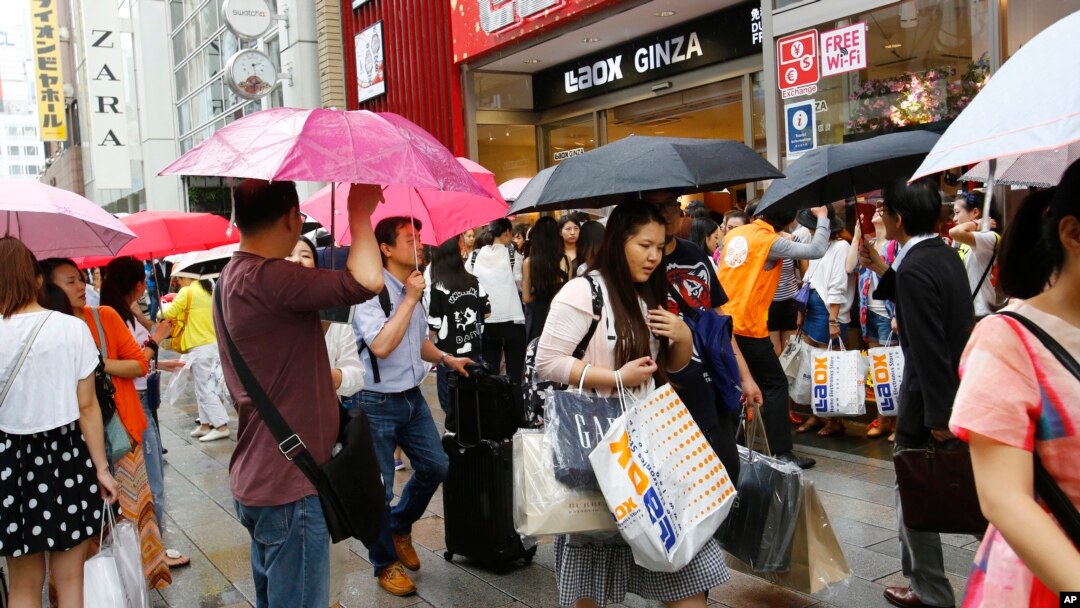Tourism sites around the world are seeing a surge of Chinese tourists during the country's National Day Golden Week holiday, despite recent national economic woes.
Online ticket booking company, Ctrip, has said it expects bookings to foreign destinations to double this Golden Week, while long-haul trips are set to increase by 50 percent.
Two research firms, Fung Business Intelligence Center and China Luxury Advisors, have said in a joint statement they expect Chinese travellers to make 234 million foreign trips in 2015.
The estimate follows months of poor economic news out of mainland China. In its latest report Monday, the World Bank scaled its projection for growth in China’s economy in 2015 from 7.1 percent to 6.9 percent.
"In particular, uncertainty surrounds the trajectory of, and spillovers from, China’s economic rebalancing and the expected normalization of U.S. policy interest rates," the Washington-based bank said.
But Chinese travel companies say they see no contradiction in a slowing economy and rising tourism.
They regard tourists as people who have built sufficient savings, and also managed to insulate themselves from the broad economic and political trends, which include the ongoing anti-corruption campaign that has shaken a large number of officials and senior executives in state owned enterprises.
“In the past, Chinese were satisfied with hoarding their savings in banks. Now, they want to spend and enjoy life,” Sabrina Li, who owns travel firm, Jong Tu, said. “Rich Chinese are no more happy about making money. They have a lot of stress in life, and consider travel as a means to happiness and relaxation.”
Stiff ATM restrictions
The tide of tourist outflows is so strong that central bank officials have expressed concerns some travelers might use the opportunity to launder money and transfer wealth. Accordingly, People’s Bank of China has imposed stiff restrictions in withdrawals from foreign locations using Union Pay debit and credit cards, the Chinese payment system.
An HSBC report said massive flows of Chinese tourists have lifted the economies of several Asian nations, including Malaysia and Vietnam, while benefiting the United States and parts of Europe as well. Thailand’s economy has looked toward tourism to offset losses in exports and a sinking currency.
HSBC predicted that outbound tourists from China will rise from 116 million last year to about 242 million by 2024, which is about the total arrivals in Indonesia, Germany, Iran and Egypt combined in a single year. Chinese tourists already account for more than 15 percent of all arrivals in Hong Kong, Korea, Taiwan, Vietnam, Thailand and Japan.
A surprise is the sudden rise in arrivals of Chinese tourists in Japan, despite continuing political tensions between Beijing and Tokyo. The number of tourists from mainland China, which does not include Hong Kong and Macau, will double during this holiday season compared to the same time last year, the China National Tourism Administration said Sunday.
The Tourism Industry Association of Japan said recently that 2.18 million tourists from mainland China visited Japan in the first half of this year, which is double the number in the same period last year.
Hong Kong numbers dip
Hong Kong, which traditionally attracted the largest number of tourists from the mainland, is a loser this time. The city saw a 5.18 percent fall in tourist arrivals in the first three days of the holiday week that began October 1. It received a total of 1.27 million visitors, which includes 430,000 from the mainland.
HSBC said the rise in Chinese tourists to Japan has been “helped presumably by the fact that the country has become a lot more affordable since the Yen started its slide a few years ago.”
It blamed the reduction in Chinese tourists flowing into Hong Kong on a stronger Hong Kong dollar and new restrictions imposed on cross border travel for day visitors.
In the United States, three cities — New York, Washington and Seattle, which president Xi Jinping visited recently — are seeing huge arrivals of Chinese tourists.
"The improved tourism environment, including the smoother visa process and more experiences in outbound tourism, have encouraged more Chinese tourists to go overseas by presenting them with more choices instead of just the traditional nearby hot spots such as Hong Kong, Thailand, and South Korea," said Xu Xiaolei, the spokesman for China Youth Travel Service.


